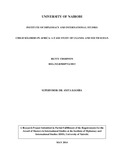| dc.description.abstract | This research project studies the phenomenon of child soldiers in Uganda and South Sudan with a view of understanding the emergence of this phenomenon, the actors perpetrating the existence of child soldiers, and solutions towards ending the phenomenon. Many treaties have been signed and ratified by states with regards to children’s rights. There are international treaties and regional treaties but children’s rights are still violated. The number of children participating in armed conflict is on the increase in the world. This research seeks to understand why this phenomenon still goes on and examines the international legal standards in place, the adequacy of the standards and possible remedies to improve the situation of child soldiers. Three main issues are discussed in the research paper. The issue of age is very important in relation to when persons can take part in armed conflict. The research argues that a universally acknowledged age should be used to describe the child. The second issue is the response of the international community towards the legal standards. It has been noted that people violate set standards because they can. This research attempts to assess the truth behind the behavior of the international community towards the phenomenon of child soldiers.
Monitoring and implementation is discussed as an important aspect of international legal procedures. Analysis and criticism are made of a selection of international organizations and Non-governmental organizations with the view to understanding the role of advocates in the campaign for children’s rights. The role of the community is examined in this research project and arguments based on the social constructivist theory that argues amongst other things that ideas, norms and culture affect the structure of the society are used. Suggestions and recommendations are given, if not to make a change, hopefully to add emphasis on the fact that the international community needs to change the way it views child soldiers and the society needs to be more involved in issues pertaining to child soldiers. | en_US |

